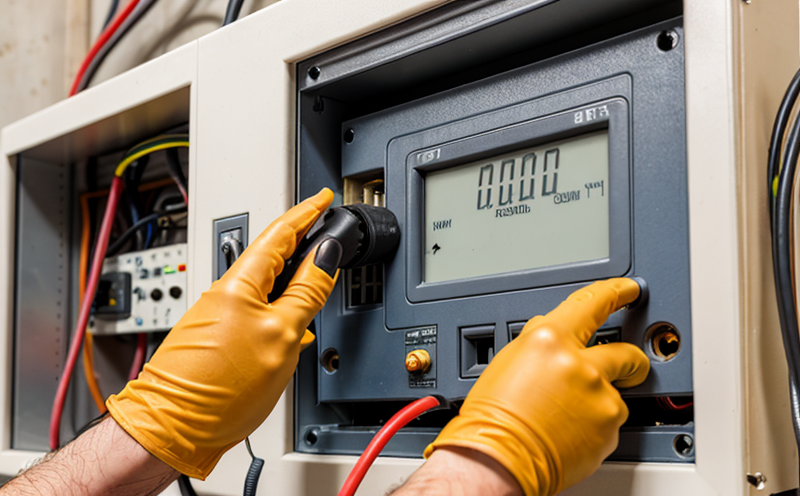ISO 12405-3 Electrical and Functional Testing of Lithium-Ion Battery Packs
The ISO 12405-3 standard is an internationally recognized protocol for the electrical and functional testing of lithium-ion battery packs. This service ensures that the performance, safety, and reliability of your products meet global standards.
Lithium-ion batteries are critical components in a wide range of devices, including electric vehicles (EVs), portable electronics, and energy storage systems. The electrical and functional testing according to ISO 12405-3 is essential for ensuring the safety and performance of these batteries under various conditions.
The testing process involves a series of electrical tests that simulate real-world usage scenarios. These tests include charging, discharging, short-circuiting, over-discharge, and other stress tests designed to identify potential weaknesses in the battery pack's design or manufacturing process. The results of these tests provide critical insights into the battery’s lifespan, efficiency, and safety.
Understanding the parameters involved is crucial for accurate testing. For instance, charging voltage limits are specified by the standard to prevent overcharging, which can lead to thermal runaway and potential fire hazards. Discharge rates also play a significant role in determining how quickly a battery depletes its energy under load conditions. Short-circuit tests help identify internal shorts that could cause overheating or failure.
Customer Impact and Satisfaction:
- Ensures product safety, reducing the risk of accidents during use.
- Improves product reliability by identifying design flaws early in the development process.
- Aids in compliance with international standards, opening up markets to global sales.
- Enhances brand reputation and customer trust through consistent quality assurance.
The testing process typically begins with a thorough inspection of the battery pack. This includes checking the cell configuration, connector types, and labeling for accuracy. Once the initial assessment is complete, the actual testing can commence. The test setup involves connecting the battery to appropriate equipment that simulates real-world operating conditions.
The equipment used in these tests includes precision measurement instruments capable of recording voltage, current, temperature, and other critical parameters. These measurements are logged throughout the duration of each test to provide detailed data on how the battery performs under stress. After completing all required tests, a comprehensive report is generated detailing the results, any issues identified, and recommendations for improvement.
The standard also emphasizes the importance of accurate specimen preparation. This includes ensuring that batteries are fully charged before testing begins, as this condition affects their performance during discharge cycles. Additionally, it specifies environmental conditions such as temperature ranges within which tests should be conducted to ensure consistent results.
Compliance with ISO 12405-3 is not just about meeting regulatory requirements; it’s also about demonstrating a commitment to quality and safety that resonates with consumers worldwide. By adhering to this standard, manufacturers can build confidence in their products’ integrity and longevity while reducing the likelihood of recalls or product failures.
International Acceptance and Recognition:
The widespread adoption of ISO 12405-3 underscores its importance within the industry. Many countries have implemented regulations that require battery packs used in certain applications to undergo testing according to this standard. This has led to increased demand for laboratories capable of performing these tests accurately and efficiently.
For businesses operating globally, compliance with ISO 12405-3 can be a significant competitive advantage. It demonstrates not only adherence to best practices but also an understanding of market expectations regarding product safety and performance. This aligns closely with the goals of quality management systems such as ISO 9001.
In conclusion, adhering to ISO 12405-3 for electrical and functional testing ensures that your lithium-ion battery packs meet rigorous international standards, enhancing both safety and reliability while positioning you well in competitive markets.
Why It Matters
The importance of ISO 12405-3 cannot be overstated when it comes to ensuring the integrity and performance of lithium-ion battery packs. These batteries power some of today’s most advanced technologies, from electric vehicles (EVs) to portable electronics like smartphones and tablets.
One key aspect that makes this testing critical is the potential for thermal runaway—a phenomenon where excessive heat builds up within a battery pack, leading to catastrophic failure. By conducting comprehensive electrical and functional tests per ISO 12405-3, manufacturers can identify early signs of instability or weakness in design, allowing them to address these issues before they become serious problems.
Another reason this testing matters is the wide range of applications for lithium-ion batteries. From consumer electronics to industrial machinery and even medical devices, there’s an increasing need for reliable power sources that perform consistently across diverse environments. Ensuring compliance with ISO 12405-3 helps guarantee consistent performance regardless of where or how these batteries are used.
Moreover, environmental concerns surrounding battery disposal have gained significant attention in recent years. Proper testing according to this standard ensures that batteries don’t contain harmful substances that could pollute landfills or water supplies if improperly managed later on. This aligns with broader sustainability goals many companies strive towards.
In summary, adhering to ISO 12405-3 is essential for maintaining high standards of quality and safety in lithium-ion battery production. It supports innovation by identifying areas where improvements can be made while also addressing environmental responsibility through responsible manufacturing practices.





